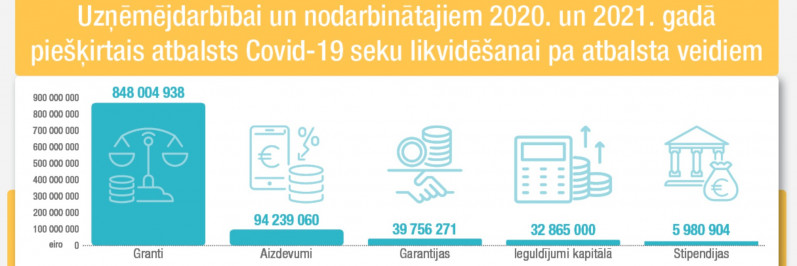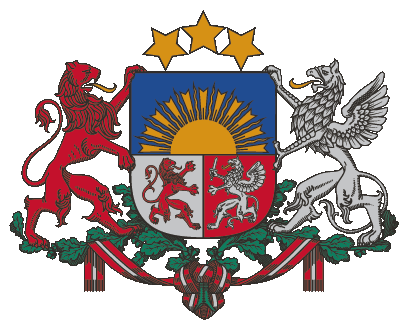
In order to help decision-makers assess the current support for mitigating the consequences of COVID-19 and to learn from experience, the State Audit Office has conducted an investigation by gathering together and comparing information on those support schemes for overcoming the consequences of the COVID-19 crisis, which can be classified as direct support for businesses and employees.
“If transparent, up-to-date and complete information is not provided about the support provided under the state support schemes for mitigating the effects of COVID-19, its amount for specific economic operators and scheme administration costs, the public cannot gain confidence in the responsible and efficient use of state budget funds. In their turn, decision-makers cannot assess the experience without the “big picture” and learn lessons for better decisions and actions in the future. Therefore, after the investigation, the State Audit Office offers the publicly available information collected in various aspects about the actually granted support to businesses and employees to mitigate the consequences of COVID-19 and the possibility to analyse it, using the information gathered by the auditors in the Power BI tool for the first time,” explained Member of the Council of the State Audit Office Inga Vilka.
The information was collected during the investigation about the support granted to businesses and employees to overcome the COVID-19 crisis under 25 support schemes in 2020 and 2021, and the beneficiaries and their further activities after receiving the support were analysed. State budget funds were allocated for the implementation of 24 schemes, but one scheme was related to reducing the expenses of businesses, that is, rent discounts granted to tenants by public sector institutions and their state-owned enterprises. Support schemes for businesses and employees were prepared by the Ministry of Economy, the Ministry of Finance, the Ministry of Culture, and the Ministry of Agriculture, implemented by several institutions such as the State Revenue Service, the Investment and Development Agency of Latvia, Altum, the State Cultural Capital Fund and the Rural Support Service.
In 2020 and 2021, up to 1.4 billion euros was planned and 1 billion euros was actually allocated within the framework of 24 support schemes in the form of grants, scholarships, loans, capital investments and guarantees, as well as, according to the information provided by the Ministry of Finance, the support received from public sector institutions in the form of rent reduction or exemption totalled to 9 million euros during the specified period. In total, support was granted to 36,928 different beneficiaries. One beneficiary could receive support under several schemes; 11,648 enterprises in total used this opportunity, some of them receiving support in up to seven different schemes. The most significant support (both in terms of amount and number of enterprises) was granted in the wholesale and retail trade, automotive and motorcycle repair sector, as well as in the accommodation and catering services sector, the manufacturing sector and the construction sector.
There was no application received under three support schemes. As a result, for example, 63 million euros from two schemes of the Ministry of Economics were redistributed to finance schemes not directly related to the mitigation of the consequences of COVID-19. Question is whether the most necessary type of support for businesses was assessed when planning support for mitigating the consequences of COVID-19.
When channelling such large funds from the state budget for support, transparent and comprehensive information on the allocation of funds must be provided. Although most support schemes require public disclosure of beneficiaries, there is no consistent approach in general, namely, the scope of the information to be made public differs both in terms of the amount of information and the range of beneficiaries. The auditors point out that some of the information has not been made public by state institutions, it is no longer publicly available, or the publicized information is incomplete.
Businesses and employees have received the largest support in the form of grants or donations of 848 million euros, e.g., in schemes like support for ensuring the flow of working capital, downtime benefit, wage subsidies, support for economic operators in the tourism sector, support for exporters of goods and services, support for manufacturers, etc. for enterprises in the agricultural, fisheries and food sectors, as well as ticket compensation for organizers of cultural events.
Regarding the types of support “loans” and “investment in capital” (127 million euros in 2020, 2021), it is expected that they will be repaid to Altum after the time provided for in agreements and the budget funds that Altum had received from the state budget for covering potential losses, should be reimbursed to the state budget accordingly. Following the assessment that the State Audit Office carried out in 2020 regarding the funds allocated by the Ministry of Economics for transferring to the Altum’s reserve capital for the support of economic operators, mitigating the effects of the COVID-19 crisis and the recommendations provided, Altum publishes information on the use of support scheme funds, revenues and their actual balance in its website and updates it twice a year.
The impact of the COVID-19 pandemic on economic activity was mainly justified by the decrease in revenues. The level of revenue reduction required to receive support varied among schemes from 5% to as much as 60%, while others did not even require quantitative proof of revenue reduction. In order to receive support depending on the support scheme, revenue reduction should occur in one specific period or in one of several periods, and the comparable periods varied greatly from scheme to scheme. This raises the possibility that the decrease in revenue might not be directly related to the imposed COVID-19 restrictions, but to other reasons, for instance, seasonality. There have also been schemes in which quantitative criteria characterizing the impact of COVID-19 were not defined, and the impact of COVID-19 was substantiated in different ways under those schemes, for example, justification was presented about the sector in general (Ministry of Agriculture), applicant for support only certified the impact without more detailed information provided for justification (support to creative people). Enterprises affected by the COVID-19 crisis also had to meet various other criteria unrelated to the impact of COVID-19, including various confirmations should be provided regarding the continuation of the activity for a certain period. Under eight schemes, support might not be received if an applicant had tax debts (over 150 or 1,000 euros). At the end of 2019, businesses in difficulty could not receive support under eight schemes; specific criteria were set for individual schemes such as area of premises, compliance with epidemiological requirements, etc. The question is whether different criteria for granting support and administrative burden, which differed from one sector to another, were justified and did not place certain sectors in a privileged position.
Administration of the support granted also requires state budget resources, but it is not known how much the administration of the aid granted to businesses and employees cost. Out of the 14 randomly audited support schemes, additional funding from the state budget has been allocated to SRS (0.9 million euros), State Cultural Capital Fund (0.2 million euros), and also to Altum for the administration of eight schemes in 2021, which is restricted access information. Therefore, the amounts of additional funds allocated to institutions for administration cannot be compared. However, after the audit of the State Audit Office, Altum publishes information on the actual administration (management) costs of the support scheme for mitigating the consequences of COVID-19 in its website. The average costs of administrating one application from additionally allocated state budget funds to state institutions differ in different support schemes: from 3 euros (additionally received by SRS) to 3,512 euros (actually used by Altum) per application, but the actual scheme administration costs of SRS, State Cultural Capital Fund and the Investment and Development Agency of Latvia, which are also financed from the funds of the existing budgets of those state institutions, have not been estimated. The Rural Support Service administered the schemes only within the framework of its existing budget and also made a cost estimate. On average 195 euros were used for the evaluation of one application.
Additional materials
Additional information
Ms Signe Znotiņa-Znota
Head of PR and Internal Communication Division
Phone number 67017671 | M. 26440185 | E-mail: signe.znotina-znota@lrvk.gov.lv
